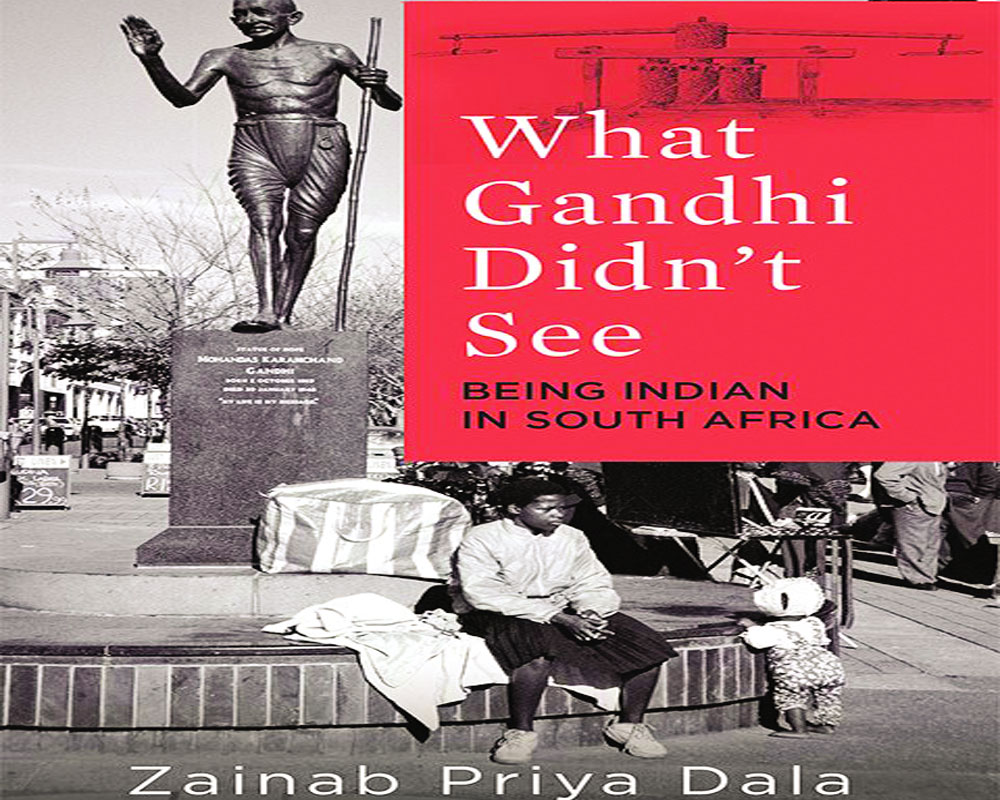What Gandhi Didn't See: Being Indian in South Africa
Author - Zainab Priya Dala
Publisher - Speaking Tiger, Rs 499
Zainab Priya Dala tackles the questions of ‘new racism’ and ‘new apartheid’ money and what the patterns in adopted names the Indian community chooses reflect. Excerpt:
Those of us Indians who were born in South Africa owned our citizenship as South Africans, and not citizens of India. Although we had a cultural and linguistic tie to being Indian, we were South African citizens, many of whom had struggled during apartheid and had fought the subjugation of people of colour. We thought of ourselves as Black, we called ourselves Black. Many of our community annoyed us greatly by using the term ‘us Indians’.
But, from 1994 to 2018 is a long time. This time saw the one thing that was a game-changer, and that was economics. Equality morphed into equity, and there was no denying that under the apartheid regime, Indian South Africans had amassed much more equity than Black South Africans. The atrocious living conditions of Black South Africans, their lack of access to fundamental human needs like shelter, clean water, sanitation, employment and education was vastly different to Indian South Africans.
Before the abolition of apartheid, the White regime created a system that clearly divided before it could unify. The winds of change had been blowing in parliament for a long while, the savvy politicians knowing that change was going to come long before they publicly gave into it. In the 1980s, the government began to sow seeds of discord by creating a system called the Tricameral System, a term that brings up the gall of many activists. The reason being, this system served to eradicate all the efforts of the freedom fighters who were Indian and Coloured (mixed race-an accepted South African term for the population group-see Preface). The Tricameral System, as its name suggests, gave the vote to three population groups. The House of Assembly was for White South Africans. The House of Representatives was for Coloured South Africans, and the House of Delegates was for Indian South Africans. This malicious system now set people against each other. Rights to education and basic human needs such as housing was given by the White regime to Indians and Coloureds. And the Blacks were lumped into a very separate unit called by the derogatory name ‘Bantu Affairs’. The use of the word Bantu itself arouses the ire of many. It is tantamount to using the -word in America. It goes without saying that the Blacks did not have the right to vote, until South Africa’s first democratic election in 1994, following the release of Nelson Mandela, when the African National Congress was recognised as a political party.
The truth is that people of Indian descent were less oppressed than the Blacks during apartheid. They were sent to live in townships such as Chatsworth or Phoenix, but the delivery of basic services such as sanitation and electricity to these townships was significantly better than that of Black townships such as Soweto or Umlazi. South African Indians also had better access to education and the schools were in significantly better condition.
There were many South African Indian people who lapped up all that was on offer, joined the House of Delegates, and pandered to their new master who had thrown them the bone. This particular system saw South African Indians prosper economically under the apartheid regime. Whilst many Indian activists rallied vehemently to boycott the House of ‘Dele-goats’ as we called it, the majority went the safe route, and accepted the benefits without a qualm. And that worked to the relative advantage of Indians, an advantage that still exists today. An advantage that has created animosity between Black South Africans towards Indian South Africans.
Following the abolition of apartheid, one of the systems that was put in place by the African National Congress was Black Economic Empowerment. Here, in an act of levelling the economic playing fields, Black South Africans were given access to mandatory inclusion in companies, universities and programmes in quota systems. Under this system, Indians were now considered Black. This ‘regrouping’ gave them the advantage of being included in the economic structures of benefit meant for the Blacks, and many having come from positions of advantage anyway- like being passenger Indians and not labourers that came from India-and having embraced the Tricameral System benefits, their advantage again saw them placed higher than Black South Africans. Leading economists have debated this since 1994. Most have argued there were no grounds for making Indians beneficiaries of Black Economic Empowerment policies.
Even though we were all oppressed, we were not equally oppressed. The result of this inequality again began sowing seeds of anger that Black South Africans feel towards Indian South Africans. I do not doubt that post 1994, the Indian population was more advantaged. I see it in my own friends and family. Many of my cousins are medical doctors who were given places in leading medical colleges during the apartheid regime. I look around me and see that the majority of Indian South Africans live in homes that far surpass the squatter camp shacks that Black South Africans still live in. Every single person I know of Indian descent has a domestic helper, including myself. And the domestic help, the maid and the gardener-they are always Black.
What Gandhi Didn’t See: Being Indian in South Africa, written by Zainab Priya Dala is published by Speaking Tiger


























